Hassan Ibrahim | Jana al-Issa | Khaled al-Jeratli
The popular movement against the commander of Hayat Tahrir al-Sham (HTS) in Idlib, Abu Mohammad al-Jolani, enters its fourth month, carrying demands for his overthrow and rejecting the policy of monopoly of power and decision-making. This is despite reforms made by the HTS and its political umbrella, the Syrian Salvation Government (SSG), and other promised but yet-to-be-implemented changes.
The scene becomes darker and more complex with the entry of figures from a religious and partisan background that hold a prior position against Tahrir al-Sham, making the movement a gateway for them to enhance their demands, perhaps riding the wave to implement their various agendas. Among them is the opponent, the Liberation Party, which forms a soft power fighting the HTS on its field. This tinted the movement with different hues, but the constant demand remains “the overthrow of al-Jolani.”
A movement led by civilians and activists, supported by military and religious figures, quickly showed signs of division or at least differences in viewpoints, prompting al-Jolani to escalate the protests, warning against crossing “red lines” and deploying the military in the streets, leading to assaults on demonstrators and increasing their anger, drawing new contours for the future of Idlib.
In this lengthy report, Enab Baladi highlights the popular movement, reviews with its activists their demands and their views on the HTS’ reforms, the obstacles facing the movement, and its future. It also discusses with experts and specialized researchers the reasons behind al-Jolani’s deployment of the military in the streets despite his claim of having 50 “cards”, and the possibility of the Syrian regime exploiting the situation to create a breach, as well as the outcomes of the movement in both escalation and dialogue scenarios.
The overthrow of al-Jolani: A firm demand in a diverse movement
Since the end of last February, the scope of demonstrations has expanded against the policy of Hayat Tahrir al-Sham and its leader al-Jolani, raising the voice demanding his overthrow, removal, and even trial, based on his unilateral decision-making, his grip on all government sectors, his closing of the “treason” file, the public emergence of torture cases in the HTS’ prisons, and the incident of a member of the Jaysh al-Ahrar (Free Army) faction being tortured to death in prison and buried without his family’s knowledge.
Hayat Tahrir al-Sham and the Salvation Government have made promises and reforms, al-Jolani has held intensive meetings, a general amnesty was issued for detainees with conditions and exceptions, committees were formed to listen to the people, building fees were canceled, and efforts are underway to form a “new Shura Council.” However, this did not stop the demonstrations as protesters deemed the reforms “superficial and illusionary, ignoring the demand to overthrow al-Jolani.”
With the expansion of protests, the movement’s divergence became evident, with initiatives and coordinations emerging such as the Dignity Initiative, followed by the formation of the Revolutionary Movement Assembly on May 8, which included the Association of Scholars in Northern Syria, the Union of Coordinating Committees, and the Dignity Initiative Assembly.
Although it carried the same demands as the protesters, the Revolutionary Movement Assembly did not represent all those involved in the demonstrations as there were activists who wanted the movement to be “purely popular” without personal biases, demagoguery, and ideologies.
Dr. Mohammed Farouk Kashkash, one of the popular movement coordinators in Idlib, told Enab Baladi that the main demand of the movement is political reform starting at the top. He stated that the reforms so far are superficial as the sensitive issues have not been addressed, such as revealing the fate of detainees, investigating the financial corruption and “treason” file, and the absence of security reforms, the latest of which was the assault on protesters.

Deployment of Hayat Tahrir al-Sham elements in the main streets of Idlib coinciding with protests in the area – May 15, 2024 (Military Media)
Obstacles and confusion
Activist and one of the movement coordinators, Abdul Rahman Talib, told Enab Baladi that the biggest obstacle facing the movement today is the gathering of Hayat Tahrir al-Sham’s components behind its leadership and their near-unanimity compared to the past three months when there was conflict between the HTS currents.
The activist believes this gathering is due to the HTS’ media machine that worked to distort the movement, alongside its religious machine, which told fighters that al-Jolani’s survival means their survival.
The activist added that other obstacles include the presence of “anomalous actors” within the movement who tried to confuse the demands, among them the Liberation Party and some other elements rejected by society.
The movement was accompanied by religious figures, notably preacher Abdul Razzaq al-Mahdi, who met with al-Jolani twice in the past three months and whose Friday sermons called for listening to the protesters’ demands and addressing them. He was among the notable demanders for revealing the details of the “treason” issue within the HTS, and faced attacks from the HTS’ affiliate media, and intimidation attempts from unknown individuals.
The popular protests were a chance for the HTS’ opponents, including dissident and former leaders, to criticize it further, alongside channels and accounts on the Telegram and X platforms that flung accusations with the HTS’ affiliate media.
Assistant researcher specializing in ethnic conflicts and non-state actors at the Omran Center for Strategic Studies, Osama Sheikh Ali, told Enab Baladi that challenges on all levels, including service, medical, and security, created a state of resentment against Hayat Tahrir al-Sham which reflected in street protests, further intensified by the detainee’s death by torture and the “treason” file.
Sheikh Ali considered that the time when demonstrations spread proved that the protest movement could not attract wide segments of Idlib’s components.
Sheikh Ali predicted the involvement of other parties in the movement to attempt to control the HTS which recently showed that it is an “unpredictable local actor,” such as attempts to expand outside its natural areas (towards the Aleppo countryside), and repeated attacks towards Syrian regime-controlled areas. The researcher suggested the presence of an entity working to “regulate al-Jolani’s rhythm so as not to cross certain boundaries.”
What does the Liberation Party want?
Meanwhile, members of the Liberation Party joined the protests, having long-standing disagreements with the policy of Hayat Tahrir al-Sham, with their protests continuing over the past years. The party describes itself as an “Islamic political party that does not recognize the borders of national states and calls for the return of the Islamic Caliphate,” accusing the HTS of “muzzling mouths, emulating the oppressive regime’s style, and freezing combat fronts,” while the HTS accuses the party of “dividing ranks, accusing the stationed fighters of treason, and spreading rumors.”
In a statement to Enab Baladi, the Liberation Party said it does not ask Tahrir al-Sham leadership for anything, especially as it sees it as just another faction among other factions, holding no genuine power and acting as a tool in the hands of states. The party demands the people reclaim their usurped decisions and choose true representatives to lead their revolution towards achieving its goals.
The party considers real reform not to be a beautification of the imposed reality but rather for the revolution to return to its former state, open battles so that those living in camps can return to their cities and villages, and roll out the wheel of liberation, directing the liberation brigades towards the regime’s capital to overthrow it. This is the genuine reform the movement strives to achieve.
Regarding the Liberation Party’s response to dialogue calls and comments that demands have been met and some are still pending, the party asserts that dialogue cannot be with those who killed the fighters and revolutionaries, liquidated them in prisons without trials, buried them without informing their families, or those who restrict people’s daily lives both mentally and physically. There is no dialogue under the threats from al-Jolani and his media and theorists, according to them.
The party clarified that since 2019 after a campaign by the HTS leadership against the party and its youth, resulting in numerous arrests, theft of radio transmitting stations, personal cars, and many other actions, their calls for a meeting have not ceased. Their terms were clear, which include the release of all youth, a public apology, the return of stolen items, and for the HTS’ leadership to publicly disclose their direction for the revolution and the project they endeavor to implement. Only after these conditions can sitting with Tahrir al-Sham be considered.
Regarding accusations that the Liberation Party only criticizes the HTS without the desire for dialogue or negotiation and only seeks to create “chaos,” the party responded that it is not a faction competing with others for control or influence but rather a party with a message and a project. This project does not belong exclusively to the Liberation Party but it is for all people. Therefore, the party calls everyone to work for this project and support it, as it is the one that will unite, consolidate, and bring victory and pride, according to them.
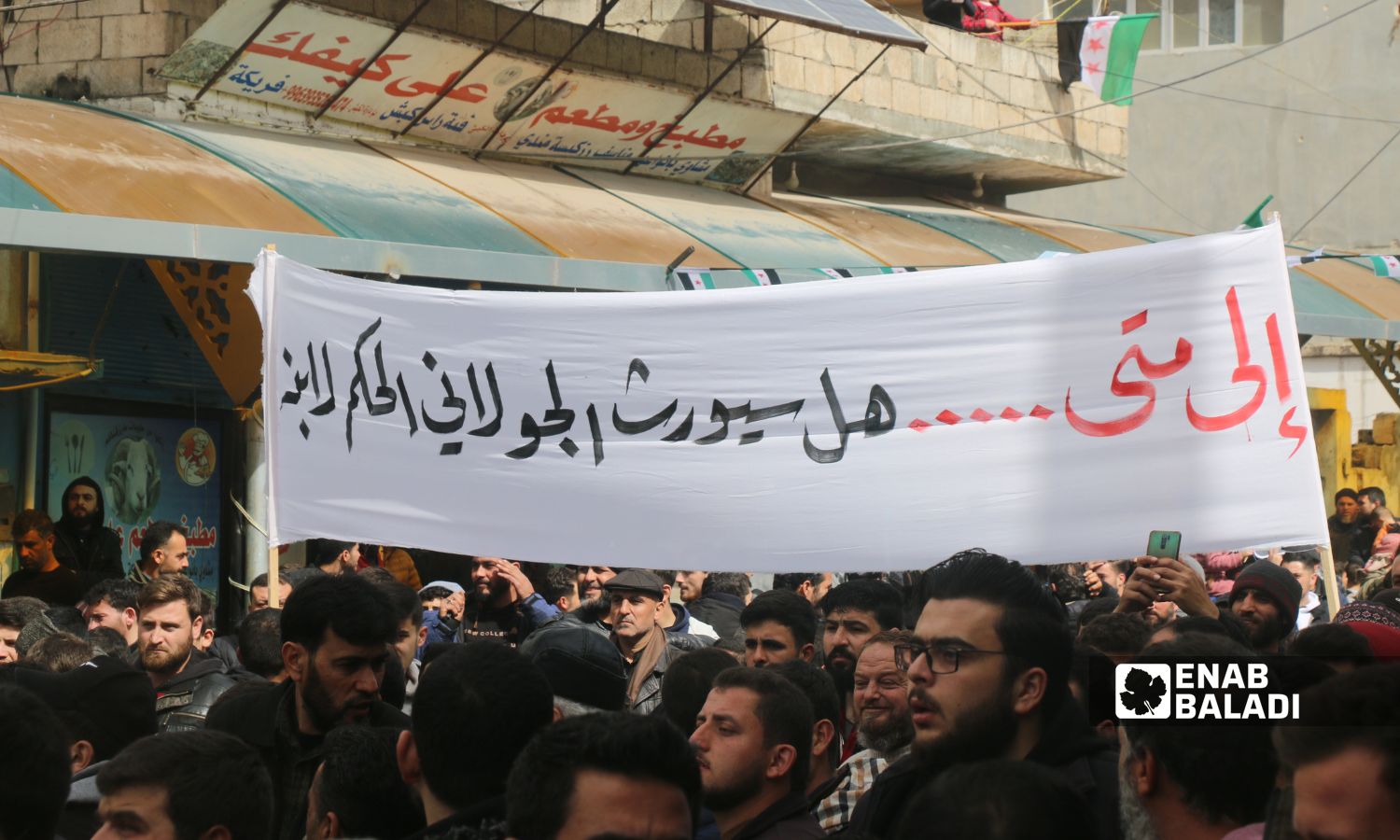
A demonstration marking the 13th anniversary of the Syrian revolution in the city of Binnish, eastern Idlib, demanding the overthrow of al-Jolani – March 15, 2024 (Enab Baladi/Iyad Abdul Jawad)
Al-Jolani uses military card against the street
Attempts by Hayat Tahrir al-Sham (HTS) to contain the protests through peaceful solutions have failed. This was evident in the incident of forcibly dispersing a sit-in in central Idlib on May 13th, during which protesters were attacked with hands and batons. The Salvation Government claimed that the assault was initiated by the protesters first.
On May 15th, al-Jolani mentioned that the HTS had previously warned that any harm to public interests and standards was a “crossing of red lines” and that the authorities would act against such actions. He asserted that most of the protesters’ demands had been met, although some remained, but that the demands had deviated from their true path.
Idlib has entered a new phase, and the liberated areas must return to order. The time for demands has ended, and we will not allow chaos and fragmentation to return.
Abu Mohammad al-Jolani, Leader of Hayat Tahrir al-Sham
Al-Jolani stated that over the past three months, the HTS had used the “dialogue language,” possessing 50 “cards” but had not used one. He added that anyone who compromised the liberated areas would face action and that they would not tolerate anyone or any group wishing to harm the liberated zones.
Two days after al-Jolani’s statement, the HTS set up military checkpoints on main roads and prominent roundabouts to prevent protesters from rural areas from reaching central Idlib on May 17th. This was followed by assaults on protesters in the cities of Binish and Jisr al-Shughour, including attempts to run over demonstrators with military vehicles.
Dr. Mohammad Farouk Kashkash considered al-Jolani’s words about the demands deviating from their path as an intentional distortion to discredit the movement, stripping its legitimacy, and demonizing it. This, he believes, aims to persuade the military wing’s members to strike it. However, the protesters trust that the military personnel will not be a tool for oppression and aggression, while holding those in power accountable for any bloodshed, given their ability to steer the ship to safety, according to Kashkash.
The rifle as a test balloon
Researcher Osama Sheikh Ali believes that the internal challenges emerging with the stoppage of armed battles in areas controlled by de facto authorities, including the HTS, reveal a lack of experience and resources in addressing various types of challenges.
Sheikh Ali states that the HTS, as a non-state actor similar to other authorities in Syria, lacks the expertise and capabilities to deal with popular protests. The lack of resources prompts it to use force and display its military power.
Alongside the protest movement, local active forces tried to exploit the protesters’ demands to achieve certain goals or settle scores with the HTS. This led al-Jolani to attempt various ways to contain the demonstrations. However, his efforts were fruitless, evolving into threats against protesters and then using force as a test balloon to demonstrate the HTS’ security cohesion.
Osama Sheikh Ali, Assistant Researcher Specializing in Ethnic Conflicts and Non-state Actors
Betting on street fatigue
Al-Jolani’s talk about the new stage was supported by the military wing. A military leader in the HTS addressed the protesters in a recorded message, saying the fighters rallied around their leadership represented by al-Jolani and the Shura Council and supported ongoing reforms. He suggested that if the protesters were sincere, they should follow the fighters’ path.
Abdul Rahman al-Haj, a researcher specializing in jihadist groups, believes the swift shift in the HTS’s behavior towards using force is an indication of intimidation. However, he pointed out that the HTS leader appears not willing to overstep the recent limits, at least for now.
Al-Haj mentioned to Enab Baladi that involving the military against the protesters holds several indicators, the most prominent being that al-Jolani realizes today’s protest crisis is “more dangerous” than previous ones, which could lead to a slide towards violence, especially since the locals form the military side of the HTS.
Al-Jolani bet on street fatigue and the quieting of protest voices. He exercised patience and waited, but the street did not relent, so he decided to intimidate without engaging in extensive suppression that could lead to an irreversible step and trigger civil conflict, thus threatening his existence as he knows he is surrounded by enemies.
Abdul Rahman al-Haj, Researcher Specializing in Jihadist Group Affairs
Researcher Abbas Sharifa, focusing on jihadist groups, mentioned that for the authority in Idlib to fall, three conditions must be met. First, there must be internal division, which is absent as the HTS remains cohesive. Second, there should be a massive popular bloc exceeding half or a third of society aiming to bring down the HTS, which is currently missing. Third, there must be external intervention, which is also absent. He discussed this during a vocal session at the Jusoor Center for Studies, attended by Enab Baladi on May 20th.
“Reform Initiative”
Following the military’s assault on protesters, activists, lawyers, engineers, and teachers called for reason, withdrawing the military from the streets, and initiating dialogue between the popular movement leadership and the HTS for a new stage free from exclusionary thinking. A committee was formed to communicate between the two parties.
Activist Abd al-Rahman Talib considered the deployment of the military in the streets an escalation in handling the situation, ruling out a current rise in violence since the reconciliation initiative is still ongoing, potentially leading to an understanding between the movement and the HTS.
Dr. Farouk Kashkash viewed the “reform” initiative as a positive step that addressed many of the revolutionary street’s demands, such as the legitimate right to peaceful protest and prohibiting arrests without judicial warrants.
However, Kashkash believed the initiative did not reach the street’s demands for genuine political reform starting from the top of the hierarchy, considering any reforms below this threshold to be fragile and easily retractable. He noted that dialogue remains open with arrangements underway for preliminary meetings.
The director of the Emergency Response Team, Dulama Imad Ali, a proponent of dialogue between the parties, mentioned that the “general reform” initiative aims for dialogue across different spectrums. It has been well-received by the authorities, the popular movement, and society, with efforts underway for swift joint meetings.
Regarding the future of the movement, Dr. Mohammad Farouk Kashkash told Enab Baladi that the movement is on an irreversible path to achieving its legitimate demands, growing and escalating at a good pace. He believes the HTS leadership is conscious and keen to resolve the current crisis with satisfying solutions and prevent further assaults.
Regime has no interest in exploiting Idlib’s “chaos”
With the continuation of the movement and the deployment of military forces, especially the HTS military wing, there has been much talk about the Syrian regime’s and its allies’ potential exploitation of the current situation to create a security or military breach near contact lines.
Researcher Azzam al-Qaseer told Enab Baladi that the state of security chaos and public unrest indeed provides opportunities for several internal and external parties to try to exploit the situation. However, the general strategic reading shows that the regime has no interest in opening the Idlib front at present or attempting to regain military and administrative control.
The Turkish military presence in northern Syria also contributes to the improbability of the regime’s military advances in the short term, according to the researcher.
Political researcher and research director at the Omran Center for Strategic Studies, Maan Talaa, stated that the Syrian regime approaches Idlib in three main ways: security infiltrations through local actors, relying on scenarios that enhance internal challenges and increase indicators of self-erosion in these regions, and through international understandings.
Talaa added that what protects Idlib and its lines are political agreements between international actors involved in the Syrian scene.
He believed the Syrian regime does not currently aim to extend control over all of Syria but aims to open supply lines through borders and foster internal trade, thereby breathing life into the stagnating economy.
Northwestern Syria is under the Moscow Agreement or the Ceasefire Agreement, signed between Russia and Turkey on March 5, 2020, by Russian President Vladimir Putin and his Turkish counterpart Recep Tayyip Erdoğan.
Turkey has 125 military sites in the region, including 57 in the Aleppo countryside, 51 in Idlib areas, ten in Raqqa, four in al-Hasakah, two in Latakia countryside, and one in Hama countryside, according to the Jusoor Center for Studies.
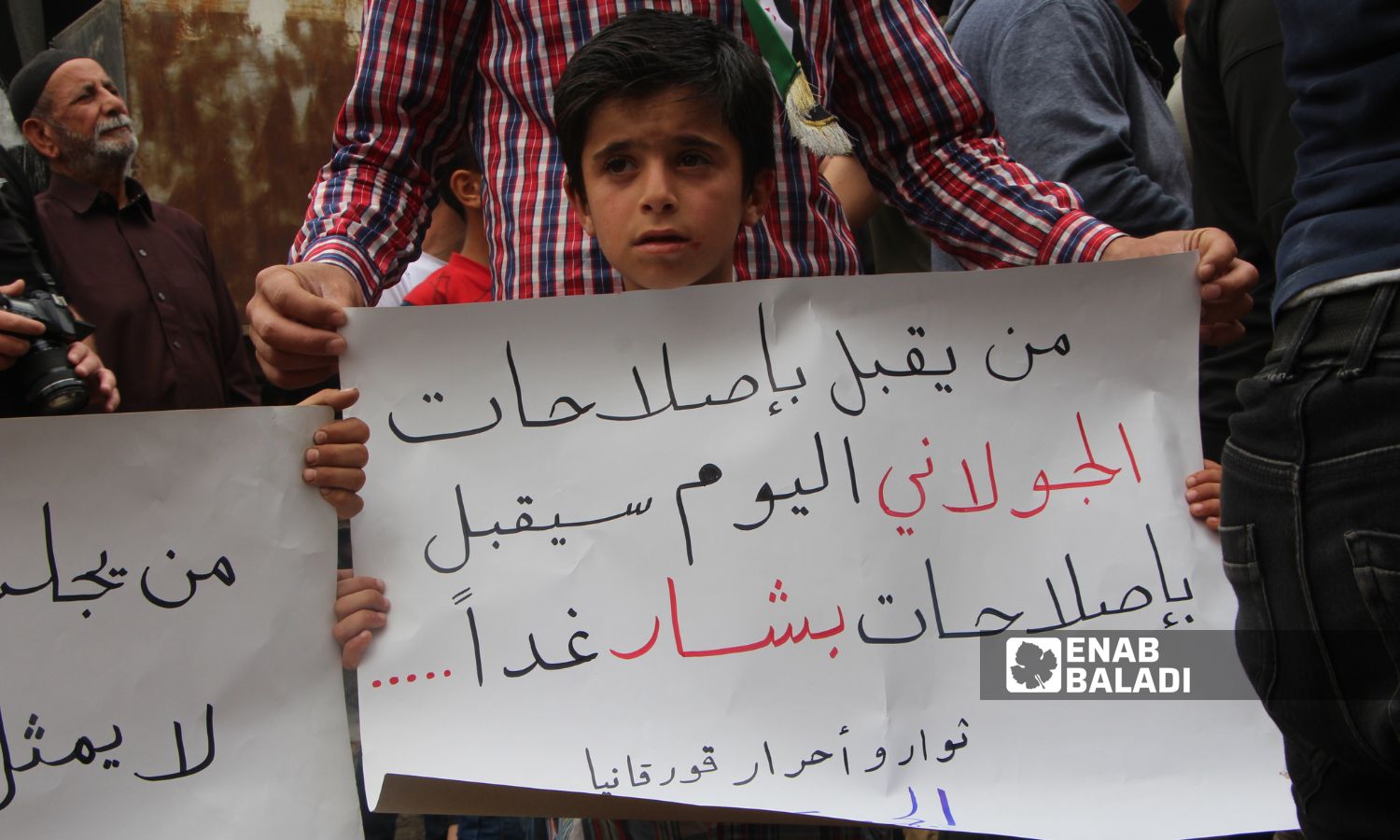
Protesters in Qorqanya in the northern Idlib countryside demand the overthrow of Hayat Tahrir al-Sham leader Abu Mohammad al-Jolani – April 26, 2024 (Enab Baladi/Iyad Abdul Jawad)
Prisons disrupt al-Jolani’s calculations
After the “overthrow of al-Jolani,” the demand for prison reform became the second most prominent demand in the protests, alongside the release of innocent detainees of various affiliations, including foreigners kidnapped by Tahrir al-Sham from Azaz, such as Abu Shuaib al-Masri and Issam al-Khatib. These demands were exacerbated by the torture operations in Tahrir al-Sham’s prisons.
On March 5th last year, the Salvation Government issued a decree granting a general amnesty for perpetrators of crimes under certain conditions and exceptions. Following this, the Minister of Interior, Muhammad Abdul Rahman, announced that the ministry had released 420 prisoners under the decree, with promises to release more included in the amnesty.
Since last March, the Salvation Government has planned to establish a security court to allow relatives of detainees to follow up on their cases and appoint lawyers for defense, in coordination with the Ministry of Justice. This court will be a secondary-level court consisting of three judges, with its own procedural system tailored to its jurisdiction.
On May 18th of this year, the Minister of Justice, Judge Shadi Muhammad al-Waisi, stated that the ministry was close to completing arrangements to establish a second criminal court specializing in criminal offenses of a security nature.
He added that he instructed the start of receiving judicial files related to the Ministry of Interior through a committee assigned by the Supreme Judicial Council. The ministry also plans to create an information office to receive inquiries regarding security-related cases.
700 people, Repercussions on governance
The number of released prisoners, as of May 24th, exceeds 700 people, and the release of detainees continues according to the general amnesty, according to explanations from the Ministry of Justice in the Salvation Government to Enab Baladi.
Enab Baladi contacted the media office of Tahrir al-Sham for clarifications regarding questions about the reasons for deploying the military on the streets, not releasing detainees who have not committed any violations as demanded by the protesters, and not releasing detainees kidnapped by the HTS from Azaz. However, no response was received at the time of the publication of this report.
I don’t know if al-Jolani’s release of more people amid the protests is out of fear, but the more important matter is attempting to maintain a certain level of stability if it is understood that the situation could escalate.
Aaron Zelin, a researcher specializing in jihadist groups in North Africa and Syria
Aaron Zelin, a researcher specializing in jihadist groups in North Africa and Syria, told Enab Baladi that from a governance perspective, it wouldn’t make sense to endanger authority. This rationale applies to Tahrir al-Sham, which is already experiencing a protest crisis.
Meanwhile, Azzam al-Qaseer, a researcher specializing in studying Islamic movements and the transformations of “Jihadist Salafism”, considered that the release of all detainees would have repercussions on the authority and power of the HTS.
Al-Qaseer suggested that the foreign detainees do not pose a significant threat to al-Jolani’s authority, given their weak ability to gather support, and because of regional and international desires to neutralize and target them directly if necessary, according to al-Qaseer’s conversation with Enab Baladi.
Al-Qaseer further stated that the real danger comes from detainees with local backgrounds and the ability to challenge the HTS’ legitimacy and policies. He added that the HTS recognizes the danger these individuals pose, especially after consecutive campaigns of arrests that targeted hundreds, most of whom were from within the HTS holding various positions.
Despite repeated talks about dealing with external parties and the existence of conspiracies and infiltrations, no confirmed details about the investigation results carried out by the HTS have surfaced. Consequently, the number of critics of the HTS and skeptics of its narrative has increased, leading to a rising belief that the charges of espionage and conspiracy are merely tools for eliminating dissidents and imprisoning al-Jolani’s opponents who can challenge his rule.
Azzam al-Qaseer, Researcher Specializing in Studying Islamic Movements and Transformations of “Jihadist Salafism”
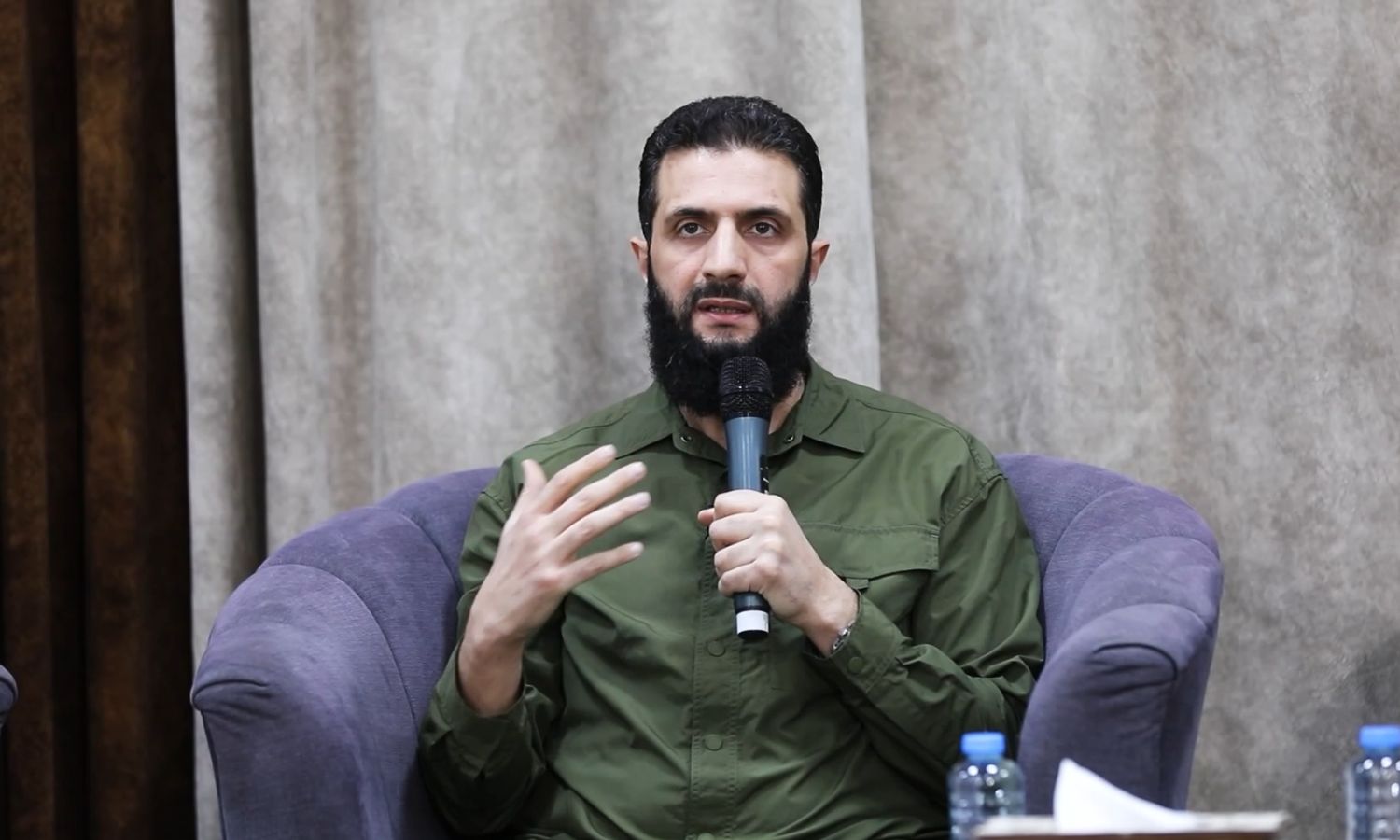
The leader of Hayat Tahrir al-Sham, which holds military control in Idlib, Abu Mohammad al-Jolani, during his meeting with dignitaries and clerics from Idlib – May 15, 2024 (Ministry of Information in the Salvation Government)
Future of Idlib: Understanding or Escalation?
The movement puts the future of Idlib city in front of several scenarios, especially since it has witnessed several changes and shifts since it was captured from the Syrian regime in March 2015 by several factions forming a joint operations room named “Jaish al-Fatah.”
This was followed by factional infighting won by Tahrir al-Sham, expanding its influence and leading the governance, with political and administrative covers formed by the Salvation Government in 2017 and the General Shura Council in 2019.
Researcher Azzam al-Qaseer predicts that the situation will explode internally in areas controlled by the HTS if the protests and security decline continue. He believes that the HTS has so far succeeded in handling the crisis of the Liberation Party supporters in a phased manner and suppressing the increasing and diverse demands of popular demonstrations, including replacing al-Jolani. However, it does not offer sustainable economic, security, and governance solutions.
Local residents in Idlib observe the transformation of the HTS’ rule into a traditional dictatorial model based on individual rule allied with a clique of religious, economic, and security figures, without any prospect or mechanisms for peaceful change.
This closed model governing with an iron fist may bring some temporary stability but opens the appetite of those coveting power for coups, rebellions, and chaos, resulting in more instability that makes the dream of economic prosperity and increased investment far-fetched.
Azzam al-Qaseer, Researcher Specializing in Studying Islamic Movements and Transformations of “Jihadist Salafism”
Assistant researcher at the Omran Center for Strategic Studies, Osama Sheikh Ali, believes that anti-HTS protests will not stop easily. Despite the legitimacy of the protesters’ demands, the protests carry other dimensions that Tahrir al-Sham may view as security-related.
Researcher Maan Talaa sees that the movement in Idlib and its consequent reactions from Tahrir al-Sham and the Salvation Government will escalate challenges in the region on all fronts. He considers that the situation will remain linked to the strategy of the revolutionary movement on one hand and the method of dealing by the HTS, which handles the matter with three tools: absorption, cautious reforms, and the threat or use of violence when necessary.
On the other hand, Abbas Sharifa, a researcher on jihadist groups, believes that removing authority in Idlib requires the presence of a technocratic apparatus and a force equivalent to the strength of Tahrir al-Sham. He predicts that events will head towards understanding and dialogue because it is impossible to resolve the issue in the streets, pointing out that the street equation is good for demonstrating the level of power.
Economic implications of violence
The popular protests come at a time when the region is experiencing deteriorating economic and living conditions. The daily wage of a worker at best reaches 100 Turkish liras (approximately three US dollars), while the recognized poverty line has reached 10,843 Turkish liras, and the extreme poverty line is at 8,933 Turkish liras.
Assistant researcher at the Jusoor for Studies Center specializing in economic affairs, Abdul Azim al-Mugharbel, told Enab Baladi that if the demonstrations continue with the HTS being able to contain them, there will not be significant negative economic repercussions on the region. On the contrary, the impacts could be positive in the long run.
Al-Mugharbel explained his viewpoint by saying that if the demonstrations continue, everyone will know they have the right to protest, even if they are workers or traders. If they face a certain issue in the future and want to protest, they will have this right, which enhances the feeling of stability in the region and thus stimulates the economic wheel, activating it well, and increasing investor confidence.
While in the case of the second scenario related to the escalation of events and violence, the situation would turn into a kind of long-term clash and confrontation that could affect many economic entities and sectors, according to al-Mugharbel.
In this scenario, people, traders, and investors might feel fear and insecurity, leading to decreased confidence in the region as a safe environment for investment and work. Some current investors might have to withdraw or relocate their investments, while new investors might hesitate to enter the market, negatively impacting economic growth.
Clashes might also disrupt workers’ daily activities, leading to market and living condition disturbances, increasing incidents of economic crimes such as theft and looting, and negatively reflecting on the social fabric.
The agricultural and industrial economic sectors could also be disrupted or sabotaged, which would result in harm to them and could lead to a recession in the region’s economy, according to al-Mugharbel.
if you think the article contain wrong information or you have additional details Send Correction
النسخة العربية من المقال
-
Follow us :












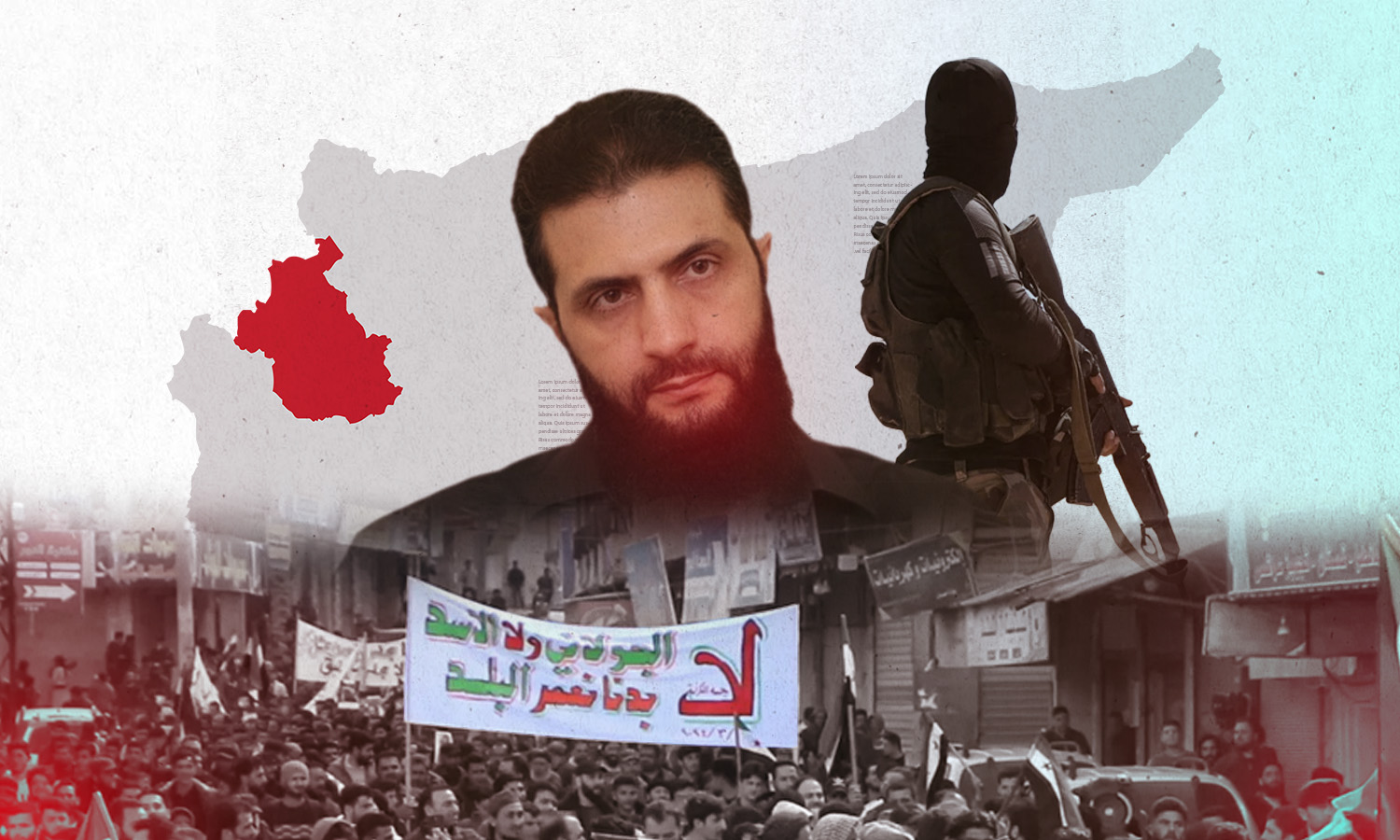
 The popular movement against the commander of Hayat Tahrir al-Sham in Idlib, Abu Mohammad al-Jolani, enters its fourth month, carrying demands for his overthrow (Edited by Enab Baladi)
The popular movement against the commander of Hayat Tahrir al-Sham in Idlib, Abu Mohammad al-Jolani, enters its fourth month, carrying demands for his overthrow (Edited by Enab Baladi)





 A
A
A
A
A
A
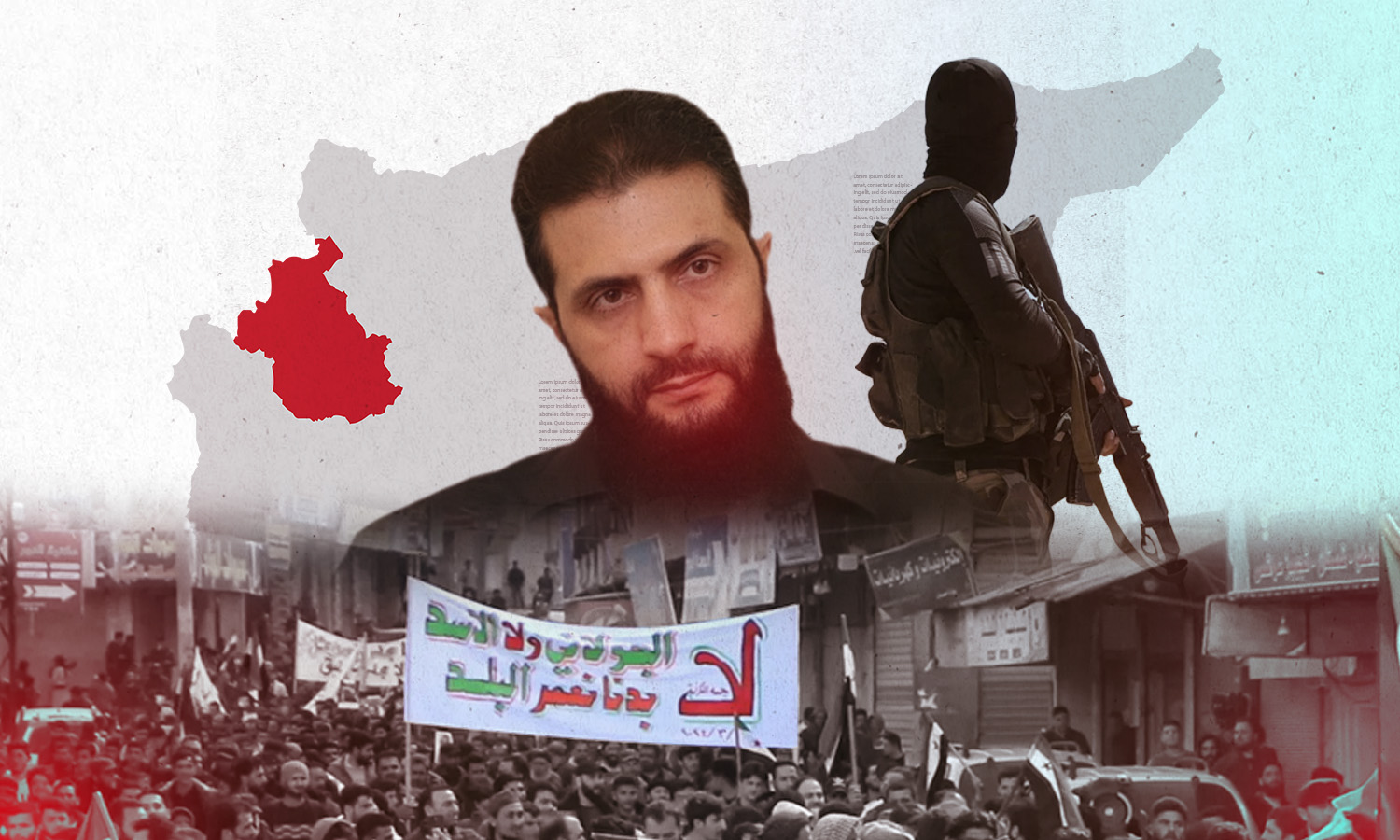
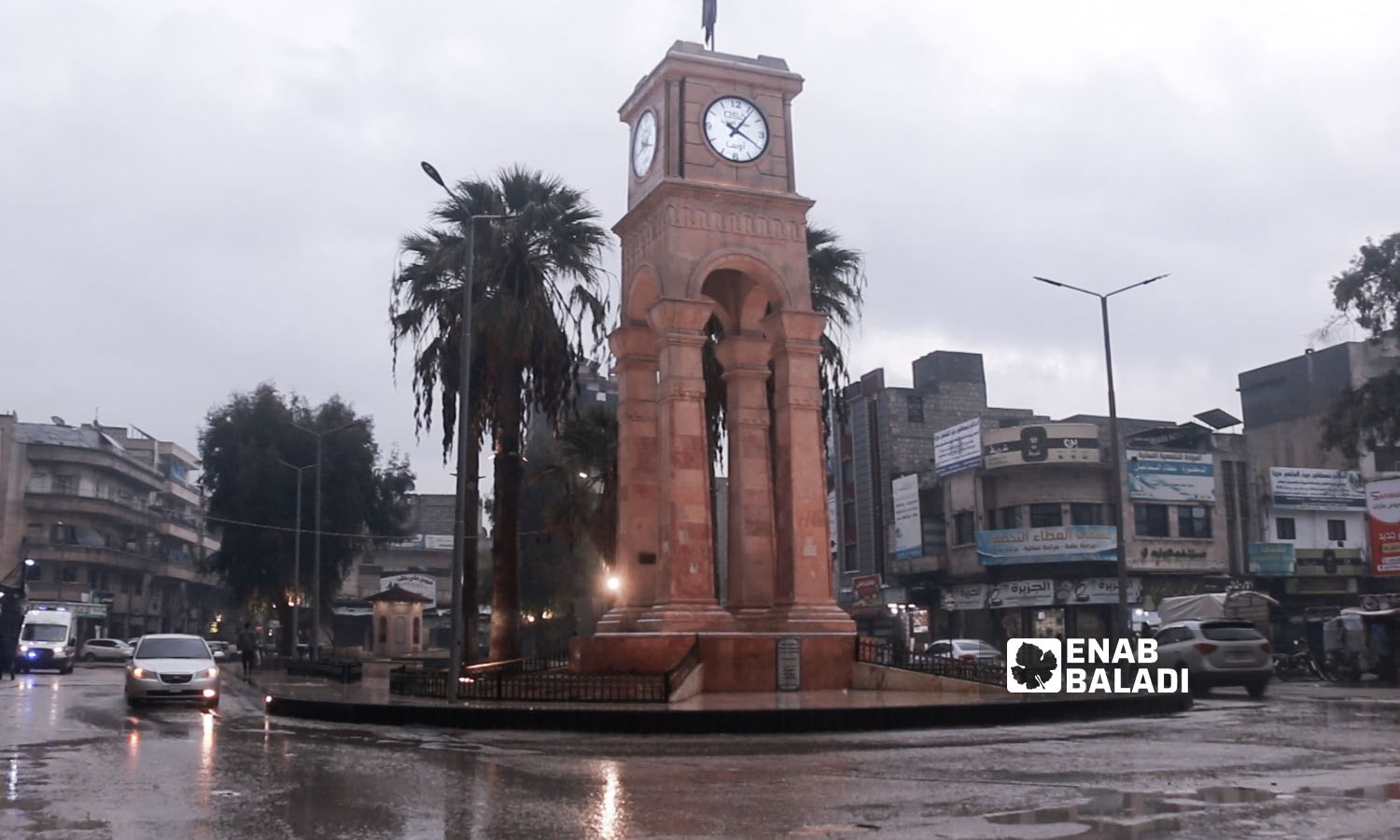


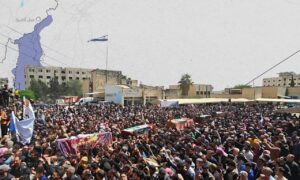




 More In-Depth
More In-Depth